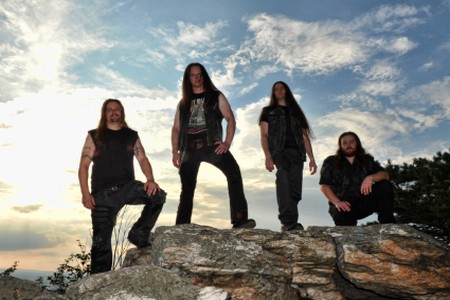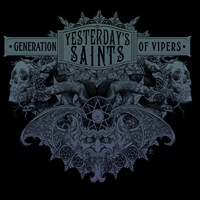Yesterday’s Saints – Heavy Metal Storyboarding
Wednesday, 25th February 2015
Concept albums are pretty traveled roads in heavy metal. Given the genre’s dynamics and lack of time constraints, it’s a fine way to help unify an album. But few bands come close to the dedication that Yesterday’s Saints have shown with their debut longplayer, Generation of Vipers. Going the extra mile and storyboarding their concept and backing up their ideas with multiple sources of research, their commitment has paid off. Generation of Vipers is an impressive body of work.
Not only impressive from a research base, Yesterday’s Saints don’t simply cater towards one genre of heavy metal to get the point across for their concept album. Songs transform from more traditional and power metal fare to aggressive death metal track by track, lending to a diversity that most bands wouldn’t dream of. Happy to dish out all of the details of their process was vocalist Matt Rice, who gave DR a call to share information about storyboarding the concept, doing research, and the opera-like set up of the album.
Dead Rhetoric: For a debut album, there was an incredible amount of research that went into Generation of Vipers. Did it ever feel like it was too daunting?
Matt Rice: Not really. We did a good job of setting up an outline and a storyboard, so we just took it in bits and pieces. I think one of the things that we were a little concerned about was getting the music right to get where our brains were with the feel of the storyboard, and making sure that flow accomplished what we were shooting for. But once we sat down and started hammering things out, it just kind of fell into place. We did a lot of things to keep the artistic energy flowing, such as pulling a lot of visual art to write music to. One of the sources that I used a lot of reference and inspiration from was Paradise Lost. There is some amazing art in that book. So there were points and times where I was able to pull a couple pieces of art and shoot it over to my guitarist and say, this song needs to sound the way this looks.
The song “Divine Tragedy,” was the first song that I wrote, and it’s based off of Paradise Lost and The Inferno, and it pulled into a concept that I had written in the past that I didn’t feel had enough steam behind it. I had written the storyboard to come up with that concept idea, but I didn’t like how it flowed and it didn’t seem to have enough to it. But when I wrote “Divine Tragedy,” it all fell into place. We decided that was the feel of the album and I started pushing forward and saying, “This is what our album should sound like.”
Dead Rhetoric: You did a storyboard for the album. So essentially what you started with were the major lyrical concepts, not the music?
Rice: Exactly. I presented the band with the concept idea once I had it. I wrote out the flow of the story, and said this is what this song is about; how do we want this song to feel? What is the primary goal of the music? What is the subgenre of metal that we want to use to accomplish this feeling? That’s how we started writing the music. From there, we had that hanging in our rehearsal studio. Albert [Born] and Witt [Black] primarily went off of that when writing riffs and coming up with ideas. They then presented it to the rest of the band, John [Batease] and myself. We then worked on the arrangement together and came up with different ideas. Fortunately, I’m a guitarist as well, so if there were some sticking points or some ideas that needed a little something – I was coming up with some riffs as well. I wrote one thing on guitar that ended up being a bass line and so on and so forth. We all just fed off of that storyboard that built up all around what we wanted to get to.
Dead Rhetoric: By using all of these different subgenres of metal, how did you make sure that things would still flow, even when you go from say, a more death metal themed track into a power metal-ish track?
Rice: That was the goal of the storyboard. During the course of writing the songs, we made sure that the outro riff from one song and the intro riff from the next song boarded well with each other. Whether it was the tempo or the key, it was written to flow almost flawlessly, and we would work those transitions into building the album. As far as what song was going to be power metal, or death, or thrash, or melodic death, or whatever, it had to happen that way with the music as it came through. So the guys would write a song, based off the feel that we wanted to accomplish, and then their music told me how I would approach it vocally. Whether it was death metal gutturals, or a thrash approach, or a power metal force or something along those lines. We went with the feel of the song, and once the music was written, it dictated the direction. It wasn’t like we just said, “this song needs to be thrash.” We said things like, “this song needs to be heavy and aggressive, and have angst.” Through that, it dictated where I was going to go vocally.
Dead Rhetoric: What was the motivation behind making sure that you had the research behind you with this album?
Rice: In this day and age of instant information through the interwebs, it gave me that standpoint that I didn’t want to write a story that was so fictionally eschew from what people had learned over the past 500-600 years as far as religion was concerned. Or even going back to 2nd and 3rd century Greek theologians. I wanted to have threads of what people where familiar with, so it would take from a portion of that “true history” if you will, according to what has been taught as opposed to the fiction that it may actually be. I whipped that together through what I was coming up with in almost a Forrest Gump type of sense. You have a fictional character working his way through legitimate history in the movie, where he is influencing history. That’s kind of the thought process that I wanted to take with that, as well as some of the thoughts of Dan Brown when he wrote Angels & Demons and The DaVinci Code. So I wanted to have that approach, where I would use “points of reality,” where people could go and be able to look on the Internet, research what I’m talking about, and then maybe make up their own mind – whether it’s in agreement with me or in stark contrast. That’s type of experience that I ended up having a desire to create for people.
Dead Rhetoric: Some of the lyrics were written in flashback, as a tribute to Paradise Lost. How much of an influence was Milton to you?
Rice: I want to say that it was a tremendous influence, with the exception of The Divine Tragedy and The Inferno – the rings of Hell and their meanings and where they go, that had tremendous influence on that song (“Divine Tragedy”). I would battle back and forth with using portions of The Bible, and then have Milton explain the story and circumstances a little bit more to me. I don’t know if you’ve ever read Paradise Lost, but it is one of the most painful fucking books to read. The use of English is almost impossible to comprehend. Using that, and finding the place in the book to complement the story, it would then allow me to be able to build in the direction that I wanted to.
Dead Rhetoric: You are using traditional metal content, such as Satan per say. Do you think that you are taking those elements that draw in metal fans and giving it more of an intellectual spin?
Rice: Yeah, kind of the goal was that I wanted to write an album. That was the first primary thing. I wanted to write something where people would want the entire album, and I thought a concept [album] would be a good way. There’s a lot of smart people and a lot of smart metalheads out there, and I really wanted to try to create something that would be more than ‘just a song’ for them to download and listen to occasionally. I wanted this to be a sit down, spend some time with some mind-altering substances if that’s what they chose to do, and try to come up with their own thoughts and ideas off of everything we had written here. Being able to do some old school kind of stuff, like sitting down with the physical album art and absorb that. Given the fact that there’s more out there with the Internet, give them that platform to go further into it if they wanted to.
Pages: 1 2























